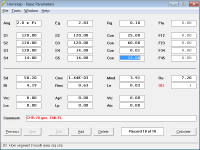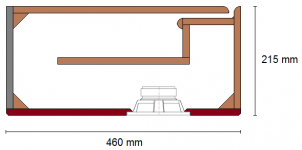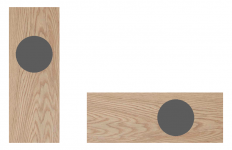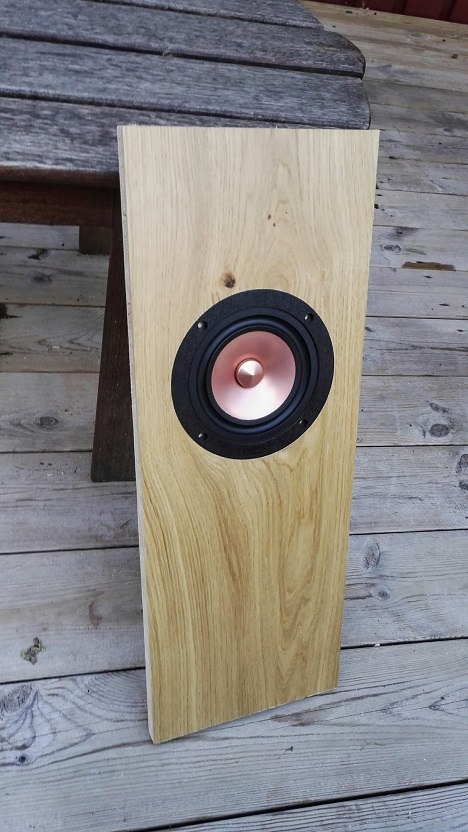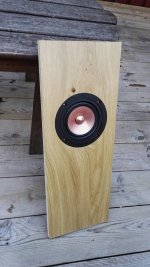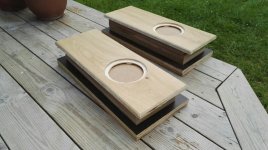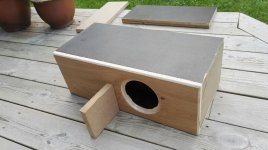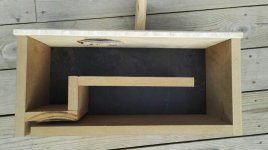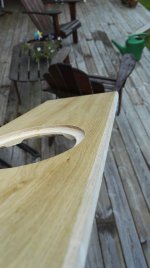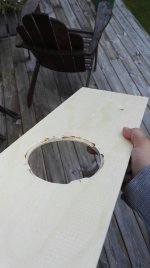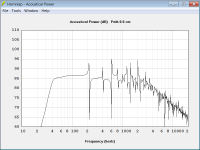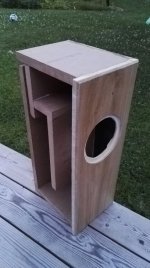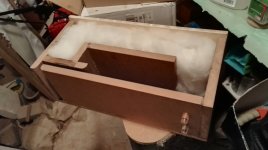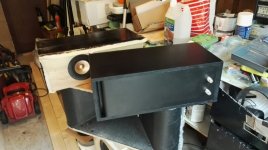I noticed I have a pair of CHR-70 gen. 3 and a TPA3116 extra so I started thinking what to do with them. My conclusion: speakers to my office at work. There's basically only one places that works, and that's on a wall shelf (~165 cm up) 2 m away from me. Depth: 28 cm (11"), width: 80 cm (31").
I've never built an MLTL, so that seems like an interesting challenge.
I played around a little in hornresp and came to this design:
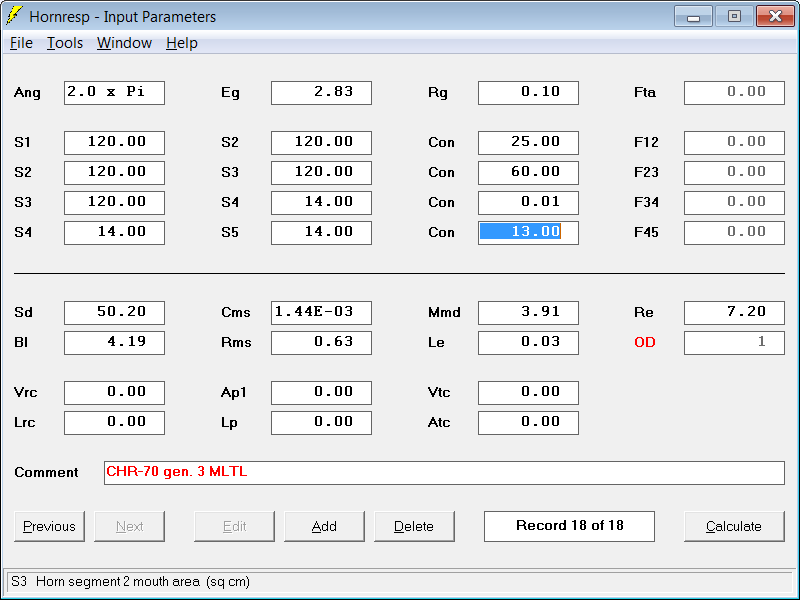
Is this the correct way to simulate MLTL in hornresp?
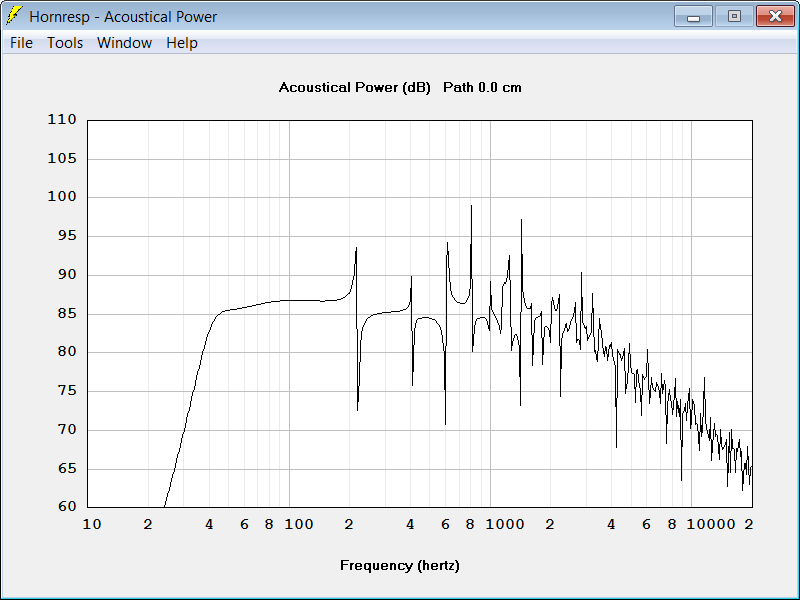
The slight down-slope towards low frequencies might be compensated by proximity to a wall.
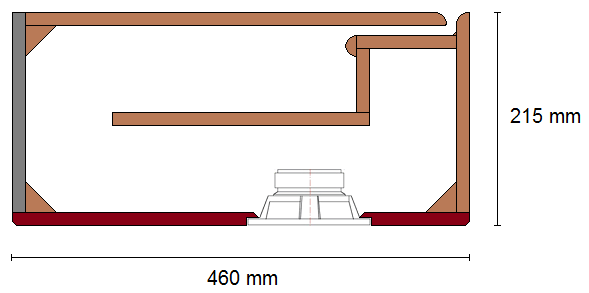
Front width is 170 mm. Internal volume ~10 l.
I have some leftover oak from a floor I put in last year which I plan to use as front pieces:
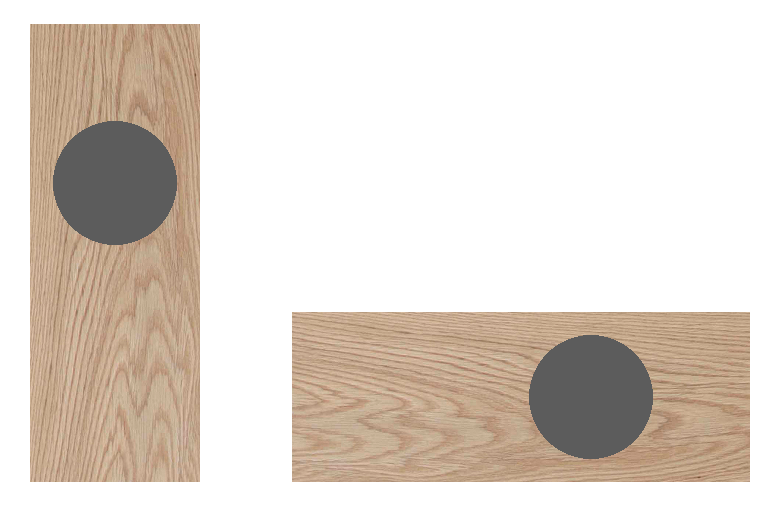
I think I'll cover the driver with speaker cloth.
I'll probably need a BSC circuit
/Anton
I've never built an MLTL, so that seems like an interesting challenge.
I played around a little in hornresp and came to this design:

Is this the correct way to simulate MLTL in hornresp?

The slight down-slope towards low frequencies might be compensated by proximity to a wall.

Front width is 170 mm. Internal volume ~10 l.
I have some leftover oak from a floor I put in last year which I plan to use as front pieces:

I think I'll cover the driver with speaker cloth.
I'll probably need a BSC circuit
/Anton
Attachments
Here is a wall mount MLTL I did for the A7.3 which will have a similar response.
http://www.diyaudio.com/forums/full-range/260758-full-range-wall-home-theater.html
Make the vent about 4in long for deeper 40Hz extension (adjust to taste):
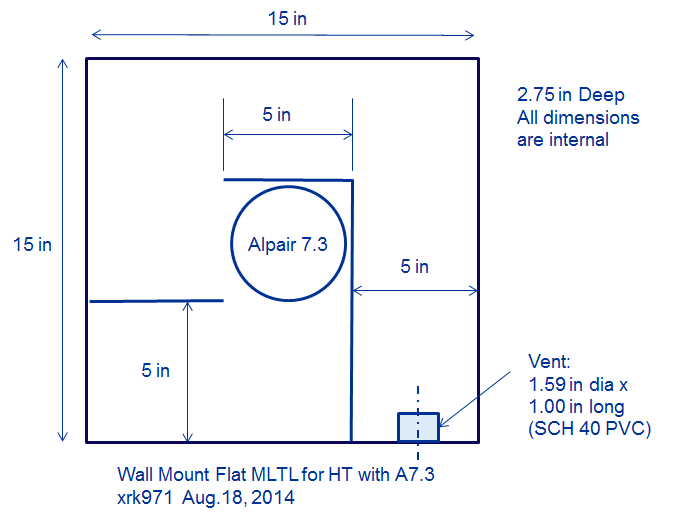
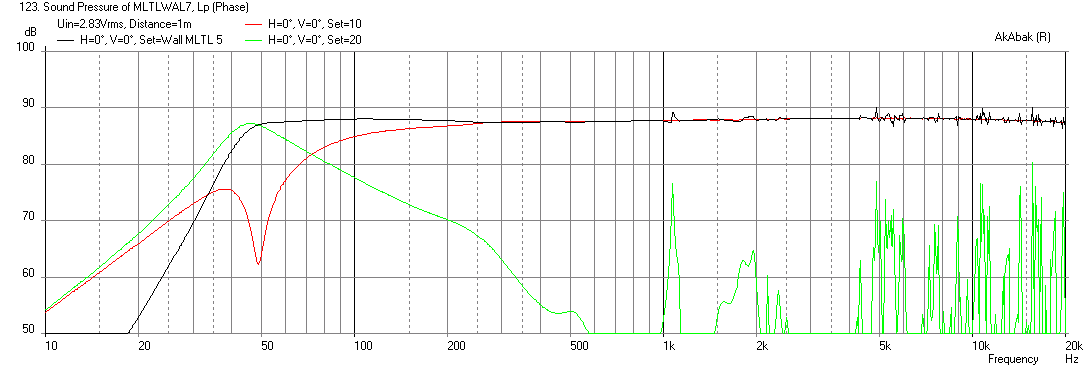
Leftover floor boards are a great repurposing.
http://www.diyaudio.com/forums/full-range/260758-full-range-wall-home-theater.html
Make the vent about 4in long for deeper 40Hz extension (adjust to taste):


Leftover floor boards are a great repurposing.
Seems practically identical except vent length 🙂 I guess that shows that the hornresp sim is ~correct.
I like the design, but on wall does however not work in my office.
/Anton
I like the design, but on wall does however not work in my office.
/Anton
Vent length in diagram shown is for 100Hz F3 for HT use. To get full range deeper bass, make vent longer. This can be adapted to a folded box like a desktop speaker but then baffle step compensation (not needed if wall mounted) will have to be used. HR does not account for baffle step losses. Typically, a 1mH and 5R resistor in series is a good starting point for a BSC circuit.
I thought round ports were preferable for MLTL designs. Do slot vents work as well? Is it just a matter of matching the port area/volume requirement?
Yes, slot vents work just as well. Look at Tabaq and Pensil designs. For very high aspect ratio slots there is more skin drag and then it's not equivalent to a round port anymore.
Clearly I've been far too to focused on Jim Griffin's designs. I'll pay more attention to Scott's from now on.
Nothing wrong with using slot ports vs. round ports for MLTLs.
I have done both types. Usually I will build my prototype with a round port as it is simple to construct but you are free to choose. Just get the parameters (area and length) worked out before building.
I have done both types. Usually I will build my prototype with a round port as it is simple to construct but you are free to choose. Just get the parameters (area and length) worked out before building.
Nothing wrong with using slot ports vs. round ports for MLTLs.
I have done both types. Usually I will build my prototype with a round port as it is simple to construct but you are free to choose. Just get the parameters (area and length) worked out before building.
Jim, et al:
Thanks for the clarification and feedback. My personal preference is for round ports whenever possible but, once again, it's nice to have options.
What I like about the high aspect ratio slot ports is you never have to worry about where you left your hole saw - I have a couple of 2" units that get used a lot for wire terminal cups, and other sizes for those silly holey braces, but other than the Microtowers, i can't remember the last time I did a round port
Last edited:
@chrisb and xrk971:
Can either of you elaborate on the term "high aspect ratio slots"? Maybe provide an example?
Can either of you elaborate on the term "high aspect ratio slots"? Maybe provide an example?
High aspect ratio means very high ratio of length to width. Very high is sort of subjective but maybe when L/D is approaching 20 you are approaching thin channel flow. An Onken actually relies on high aspect ratio vents to provide additional damping.
By width I mean hydraulic diameter or gap width. A capillary tube or straw is an example of a high aspect ratio flow device vs a 2in dia X 6in long duct.
By width I mean hydraulic diameter or gap width. A capillary tube or straw is an example of a high aspect ratio flow device vs a 2in dia X 6in long duct.
As I used slightly different material than planned I remade the hornresp sim:
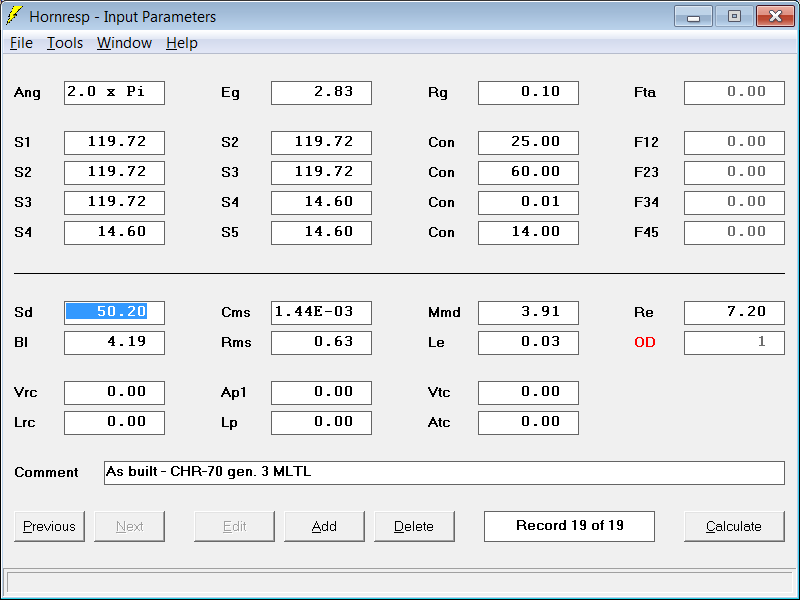
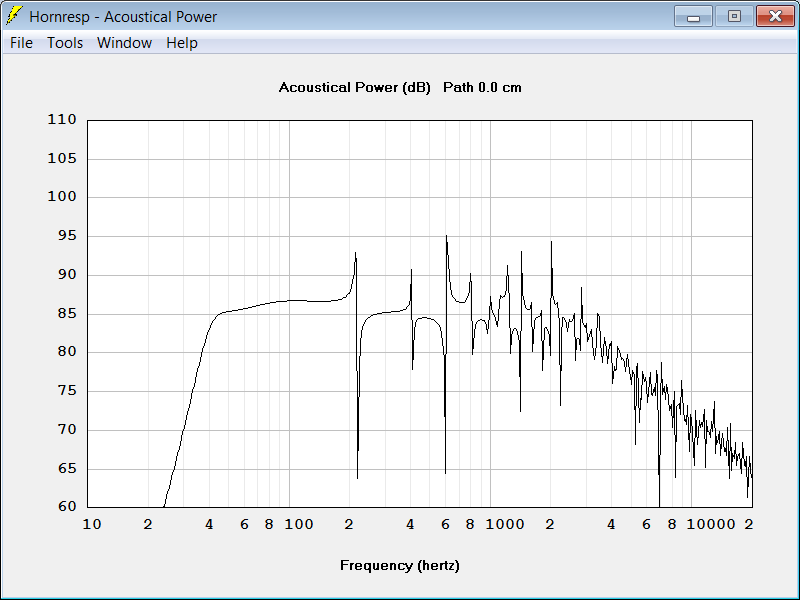
No noticeable difference (I made the vent slightly longer than before).
2.5 W gives ~90 dB at 1 m and 12 m/s in the port.
How reliable are the parameters from MarkAudio?
/Anton


No noticeable difference (I made the vent slightly longer than before).
2.5 W gives ~90 dB at 1 m and 12 m/s in the port.
How reliable are the parameters from MarkAudio?
/Anton
Attachments
Measurements!
I've done some measurements, partly to figure out what BSC to make and partly to compare the new and the damaged driver I'm using. All measurements at 1 m (except nearfield of course).
Here's raw vs with low shelf (5 dB, 500 Hz, Q=0.7):
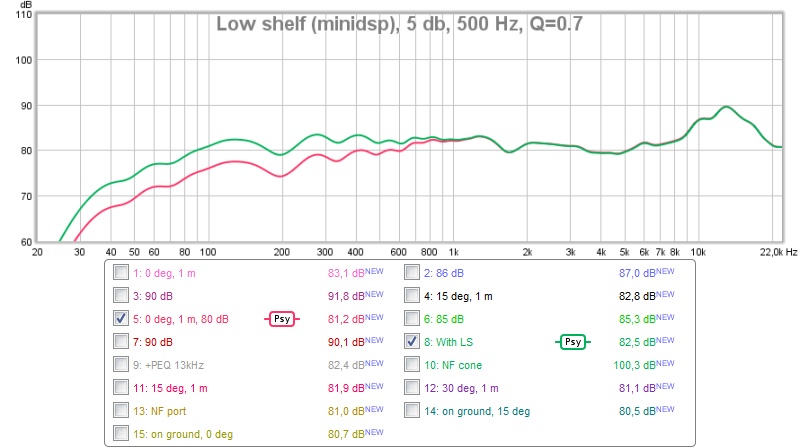
Distortion at ~81 dB:
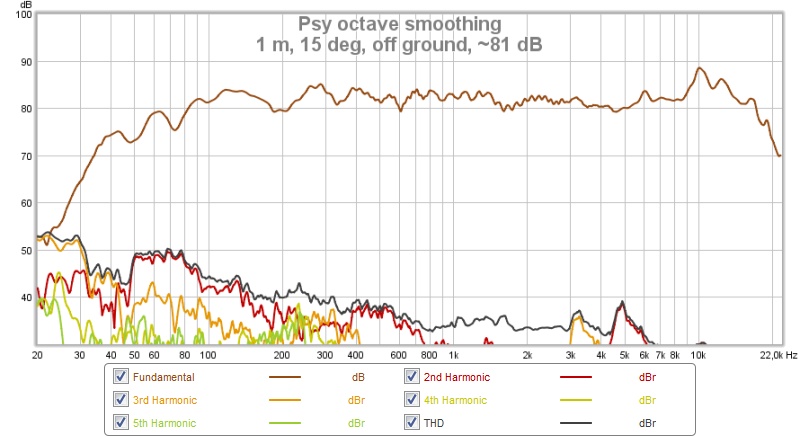
Polars (0, 15, 30 deg):
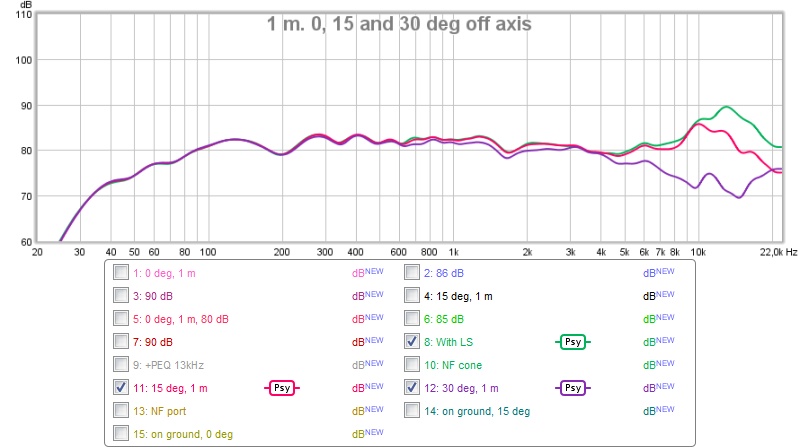
Nearfield measurement (cone and port):
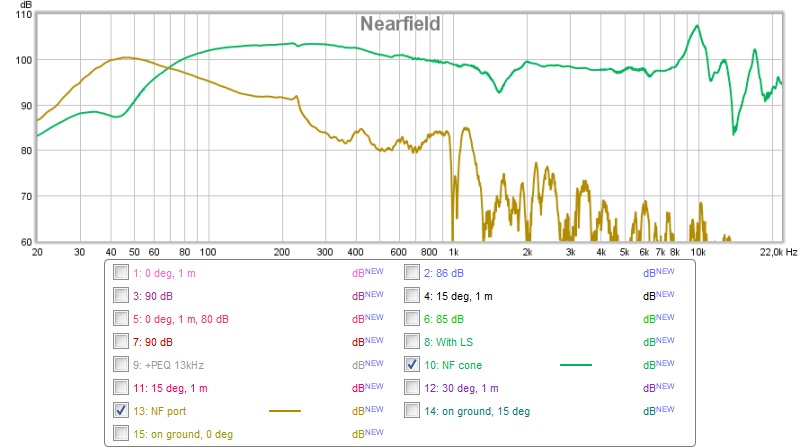
Comparison of the two speakers (15 deg off axis):
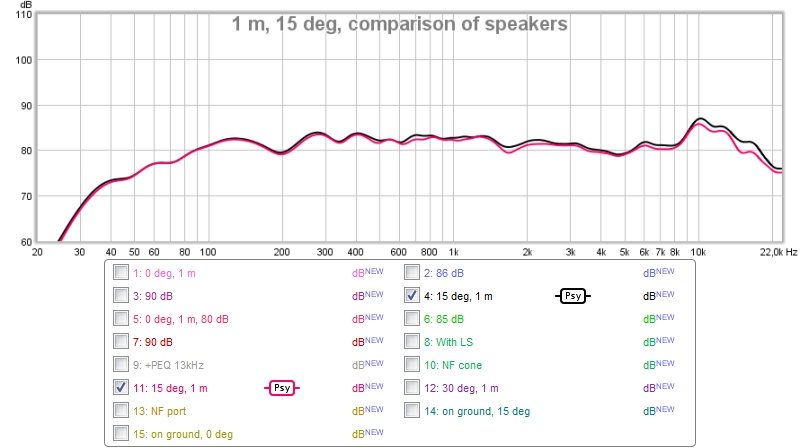
The damaged cone seems to have lost a little of the top octave, it's mostly aesthetic though.
And here's a measurement with the speaker 2" from the ground emulating how it will be positioned on the shelf in my office:
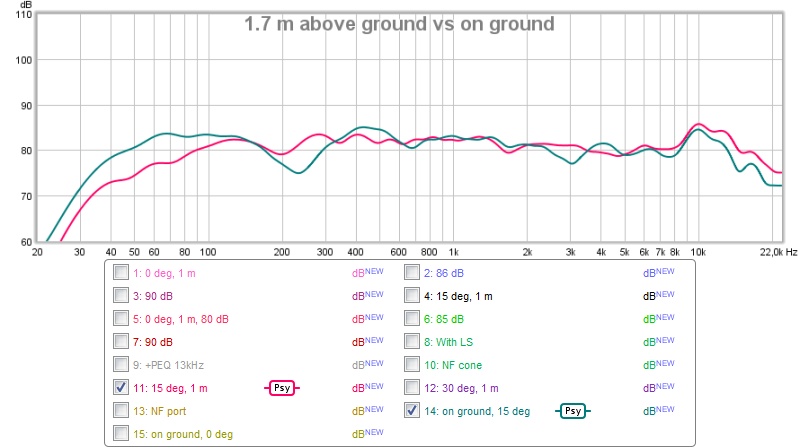
Lifts the low end quite nicely, should not feel boomy. This is what the measurement looked like:
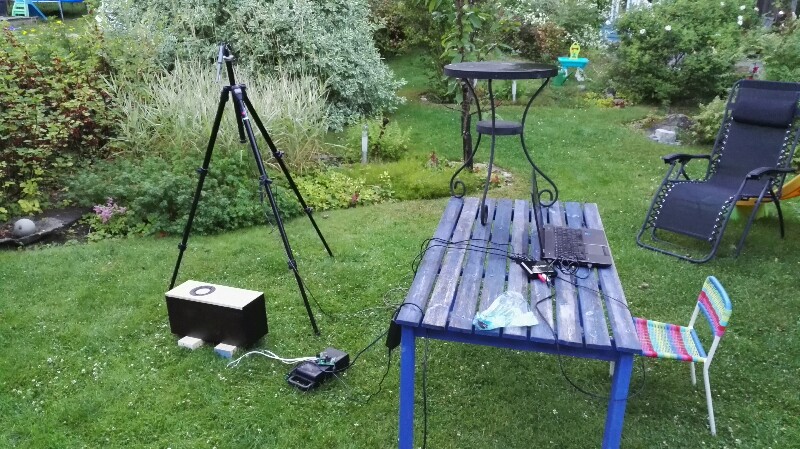
This is the damaged driver:
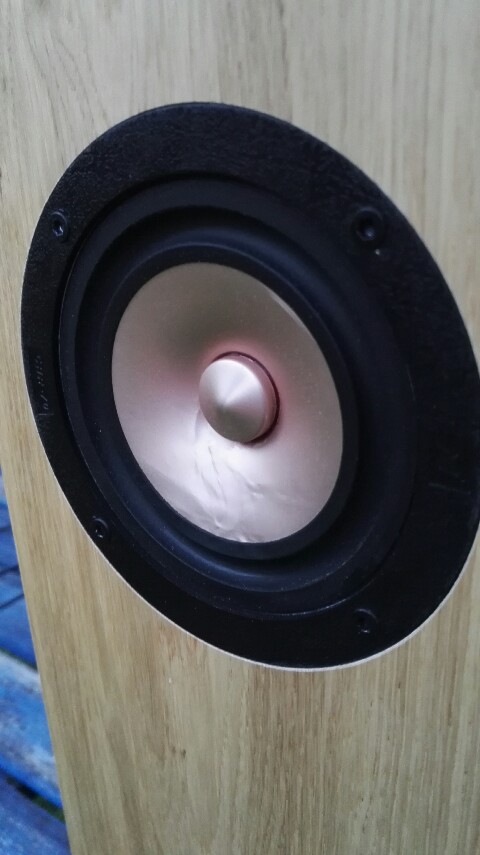
The cone was more damaged than what is visible, I had to reshape it with my fingers and glue the cone to the voice coil. It was damaged during a move and is the reason this speaker came to be. My father (the owner of the repaired speaker) wanted it replaced for aesthetic reasons and they can only be ordered in pairs.
/Anton
I've done some measurements, partly to figure out what BSC to make and partly to compare the new and the damaged driver I'm using. All measurements at 1 m (except nearfield of course).
Here's raw vs with low shelf (5 dB, 500 Hz, Q=0.7):

Distortion at ~81 dB:

Polars (0, 15, 30 deg):

Nearfield measurement (cone and port):

Comparison of the two speakers (15 deg off axis):

The damaged cone seems to have lost a little of the top octave, it's mostly aesthetic though.
And here's a measurement with the speaker 2" from the ground emulating how it will be positioned on the shelf in my office:

Lifts the low end quite nicely, should not feel boomy. This is what the measurement looked like:

This is the damaged driver:

The cone was more damaged than what is visible, I had to reshape it with my fingers and glue the cone to the voice coil. It was damaged during a move and is the reason this speaker came to be. My father (the owner of the repaired speaker) wanted it replaced for aesthetic reasons and they can only be ordered in pairs.
/Anton
Attachments
-
 on vs off ground.jpg77.1 KB · Views: 559
on vs off ground.jpg77.1 KB · Views: 559 -
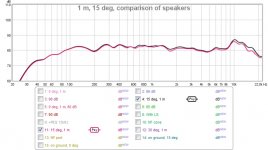 comparison.jpg73.7 KB · Views: 545
comparison.jpg73.7 KB · Views: 545 -
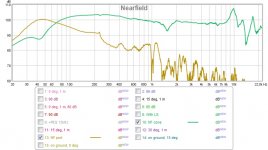 nearfield.jpg82.1 KB · Views: 530
nearfield.jpg82.1 KB · Views: 530 -
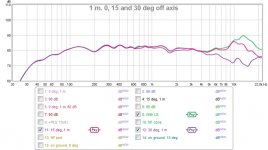 polars.jpg76.2 KB · Views: 565
polars.jpg76.2 KB · Views: 565 -
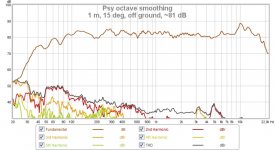 dist 81 dB.jpg91.6 KB · Views: 563
dist 81 dB.jpg91.6 KB · Views: 563 -
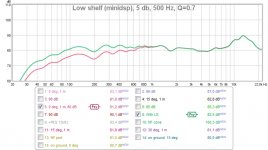 low shelf.jpg80.7 KB · Views: 553
low shelf.jpg80.7 KB · Views: 553 -
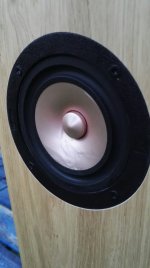 IMG_20160730_212255-480x855.jpg67.8 KB · Views: 525
IMG_20160730_212255-480x855.jpg67.8 KB · Views: 525 -
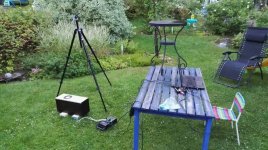 IMG_20160730_211634-800x449.jpg166.2 KB · Views: 505
IMG_20160730_211634-800x449.jpg166.2 KB · Views: 505
- Status
- Not open for further replies.
- Home
- Loudspeakers
- Full Range
- CHR-70 gen. 3 in folded MLTL
